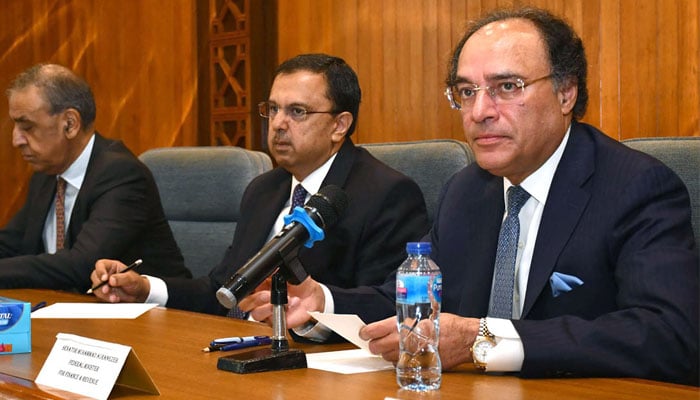Finance ministry projects inflation moving towards single-digit rates
Economy moved towards stability in FY2024 with decreasing inflation, surplus in primary fiscal account, monthly economic outlook says
The Ministry of Finance has forecast July inflation to fall between 12% and 13%, with further cooling in August to 11% to 12%, and expressed optimism about reaching single-digit rates in the future, according to its monthly economic outlook released on Tuesday.
"Economy moved towards stability in FY2024 with decreasing inflation, a surplus in the primary fiscal account (Jul-May), a negligible current account deficit, and a stable exchange rate," the finance ministry in its Monthly Economic Update and Outlook said.
Inflation figures likely to be released on Thursday by the Pakistan Bureau of Statistics (PBS) are closely watched by the central bank, which cut rates this week for the second time in a row as previously surging inflation was tempered.
The State Bank of Pakistan (SBP) on Monday reduced the interest rate by 1% or 100 basis points (bps) from 20.5% to 19.5%, the second cut in a row, citing a slight cooling in the inflation rate — a move that is mostly in line with the general market consensus.
Addressing a press conference after the Monetary Policy Committee (MPC) meeting, SBP Governor Jameel Ahmad said, "We have noted that the inflation is on a declining trend.”
According to the report, in the real sector, agriculture outperformed, whereas large-scale manufacturing (LSM) is set to take off. LSM expanded 1.0% during Jul-May FY2024, compared to last year's contraction of 9.6%.
In May 2024, LSM registered growth of 7.3% year-on-year (YoY) and 7.5% month-on-month (MoM), driven by strong performance in food, apparel, leather, coke & petroleum products, chemicals, pharmaceuticals, and machinery and equipment.
"In June 2024, CPI inflation reached the cusp of the single-digit range." the finance division said in the report.
The external account position improved due to contained imports resulting from prudent fiscal and monetary management, while exports and remittances increased significantly, the report said.
The government had also cut the fiscal deficit to 4.9% of GDP between July 2023 and May 2024, the ministry said in its report, down from 5.5% last year.
To further strengthen stability, the government has recently reached a staff-level agreement with IMF on a 37-month Extended Fund Facility Arrangement (EFF) for $7 billion. The loan programme includes tough measures such as higher taxes on farm incomes and electricity prices.
This prospect has aroused concern among poor and middle-class Pakistanis contending with the threat of further inflation and higher taxes.
Inflation has slowed in recent months after hitting more than 30% in 2023. Pakistan's consumer price index (CPI) rose 12.6% in June of the year, compared to 11.8% in the previous month and 29.4% in June 2023.
But pressure continues and one party has held protests in recent days and threatened sit-ins in major cities if the government does not tackle rising prices.
-
Global memory chip crunch puts spotlight on Apple; Will iPhone become more pricey?
-
Bitcoin plummets toward $60,000 as investors dump risky bets
-
Bitcoin crashes below $63K as regulatory pressure and market fears grow
-
Bitwise Crypto Industry innovators ETF: What investors should do in 2026?
-
Nintendo shares slide again as momentum fears grow
-
Gold, silver prices fallen sharply; What’s driving the drop?
-
Gold’s record climb: Experts question if its safety is ‘overstated’
-
Dubai unveils plans to construct street built with real gold












